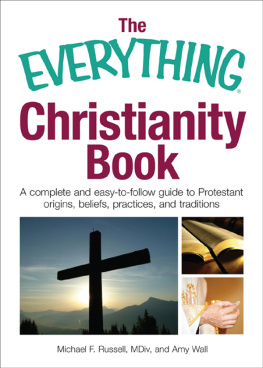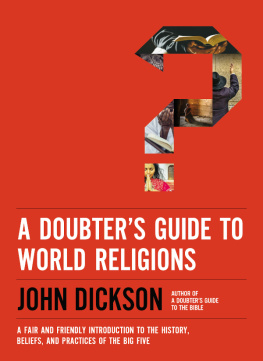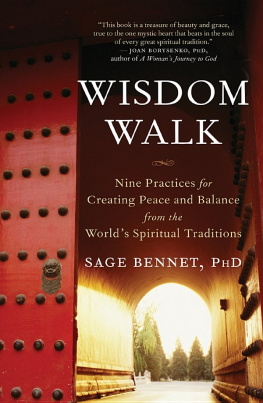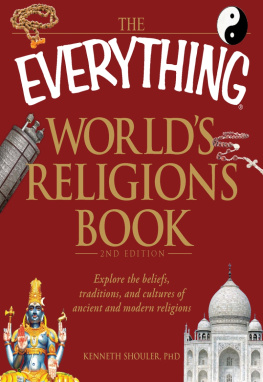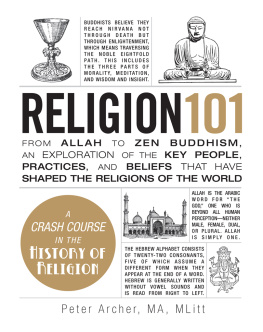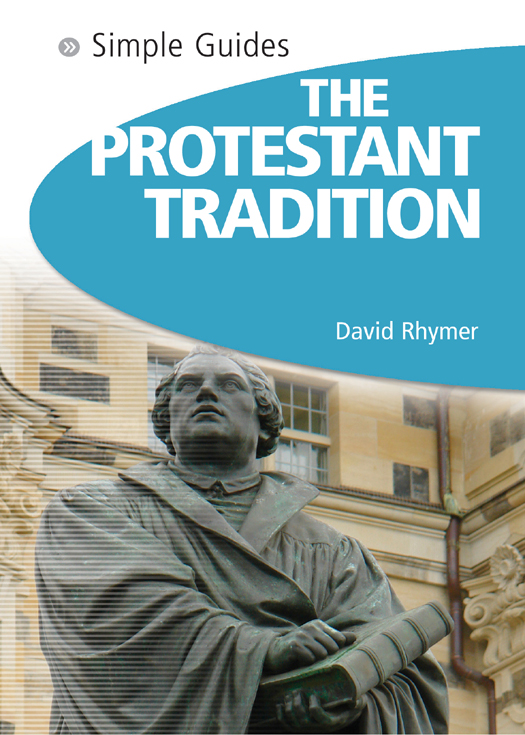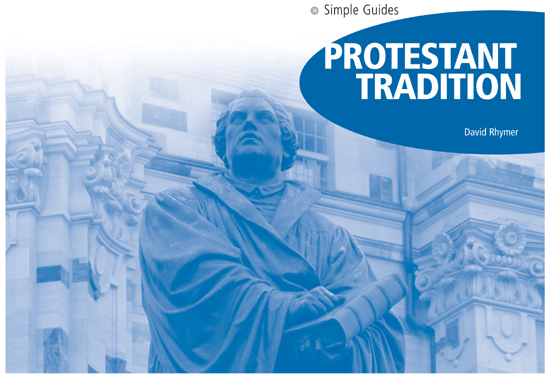Published in Great Britain by
Simple Guides, an imprint of Bravo Ltd
59 Hutton Grove, London N12 8DS
www.kuperard.co.uk
Enquiries:
First published 2001 by Global Books Ltd.
This edition published 2008
Copyright 2008 Bravo Ltd.
All rights reserved. No part of this publication
may be reproduced, stored in a retrieval system,
or transmitted in any form or by any means
without prior permission in writing
from the Publishers
eISBN: 978-1-85733-636-8
British Library Cataloguing in Publication Data
A CIP catalogue entry for this book is available from the British Library
Cover image: Statue of Martin Luther outside the
Frauenkirche, Dresden. istockphoto
Drawings by Irene Sanderson
v3.1
About the Author
DAVID RHYMER claims the distinction of being (probably!) the only confirmed Anglican, ordained Baptist, working Methodist minister in Britain. As such he has a wide experience of life in three of the main Protestant traditions, and has encountered a number of others through his ecumenical connections which extend to a French Roman Catholic monastery. Having worked as a teacher, a Baptist minister and a Methodist minister, he is currently involved in adult theological education with Exeter University, and with adult training and education in the Methodist Church.
List of Illustrations
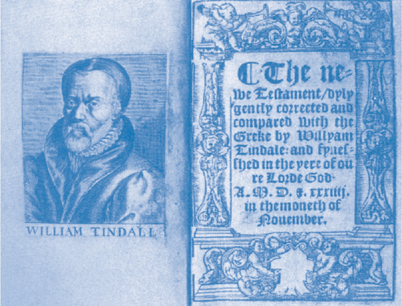
The First Revision (1534) of William Tyndales New Testament in English, showing title page with facing portrait. The First Edition was published in 1526
Foreword
There is a huge variety of interpretations of the word Protestant and this excellent introduction by David Rhymer makes this crystal clear. From the recent troubles in Ireland to the origins of the term in sixteenth-century Germany, this book describes for us the phenomenon and its development.
David Rhymers text never loses clarity for the sake of brevity. He makes it clear, for example, that Anglicanism does not fall classically into the wider context of Protestantism but instead stands somewhere between Roman Catholicism and Protestant Christianity.
In describing the twentieth-century development of Protestantism we encounter a dazzling spectrum including Albert Schweitzer, Karl Barth, Dietrich Bonhoeffer and even Desmond Tutu.
This guide offers a map of the terrain which will be of use to a wide range of people. Those beginning to study the subject for the first time will be encouraged, and those who simply have a general interest will be stimulated and provoked there could not be a better introduction.
STEPHEN PLATTEN
Dean of Norwich
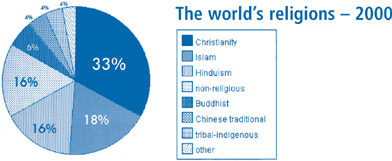
The worlds population in the year 2000 was approximately 6 billion (6,000,000,000). Around 2 billion would consider themselves Christian, although this figure includes nominal adherents and also groups that may be regarded as being on the extreme fringes of mainstream Christian belief.
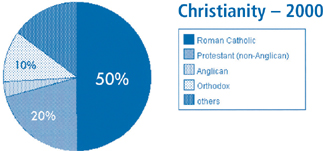
Of the worlds 2 billion Christians, 1 billion are Roman Catholic and 220 million are Orthodox. Just over 400 million are Protestant, of whom 200 million could be described as conservative/evangelical. 40 million of these are Baptists. There are around 70 million Anglicans world-wide. The remaining 300 million include some pentecostal groups who may not call themselves Protestant, but who may share some traditional Protestant beliefs it is important to note that all churches and religious groups use different ways to calculate their membership.
Preface
Why a book on the Protestant Tradition at the start of the third millennium? Surely the Christian Church is trying to move on from the (all too often painful) divisions that have marked the story of the Church over the last thousand years? Well, yes, it is. It is to be hoped that the next thousand years will tell a very different story. But before the next chapter can be written we need to understand the story so far. So this book is an attempt to do just that, and in so doing to introduce the reader to some of the significant people, events and ideas that have shaped a religious tradition that has influenced the history, culture and politics of the Western world for the last five hundred years, and which still influences the lives of around eight per cent of the worlds population (a quarter of all Christians).
One thing you will soon discover is that Protestant is a very wide-ranging term. A glance at a typical British town, for example, will reveal a variety of different Protestant churches Church of England, Methodist, Baptist, United Reformed, Brethren, Salvation Army, Pentecostal, Quaker, and probably one or two that you have never heard of before! And in North America you will come across around three hundred brands of Protestantism a number that continues to grow year by year. Yet within this diversity (and you only have to visit two or three different Protestant churches to discover just how diverse they are) there is a common (sometimes very thin!) thread of religious practice and belief that can be traced back to the people, ideas and events which rocked sixteenth-century Europe.
This book aims to help guide you through that diversity, as well as explore some of those religious practices and beliefs. For those who belong within this tradition it should help them to understand where their particular bit of that tradition fits into the bigger picture. And for those who are simply curious it tells a story that certainly is not finished yet.
DAVID RHYMER
Chapter 1
Introduction: Some Essential History
Mention the word Protestant and what springs to mind? For many in Britain, with Northern Ireland so much in the news over the last quarter of the twentieth century and the beginning of the twenty-first, the immediate thought is of strident voices raised in bitter, sectarian conflict, of political marches even of terrorist murder. And what, many would go on to ask, has that to do with Christianity? Not a lot, you might think. But organized religion, as a product of human thought and a pattern for human behaviour, owes as much to external social, cultural and political influences as it does to profound beliefs concerning life, the universe and everything, And society, culture and politics have, in turn, been profoundly influenced by organized religion. This is as true of Christianity as it is of, say, Judaism or Islam and is as true today as it has ever been.
The story of the Christian religion over the last two thousand years is proof of this: born out of revolutionary religious ferment in first-century Palestine; adopted by Constantine as the state religion of fourth-century Rome, and caught up with the declining years of the Roman Empire; preserving classical culture during the Dark Ages and then fundamentally shaping medieval Europe, giving divine authority to the claims of kings and emperors; inspiring the colonization of Africa, Asia and America; legitimizing wars and revolutions and influencing the science, art, philosophy and literature that is Western culture.


